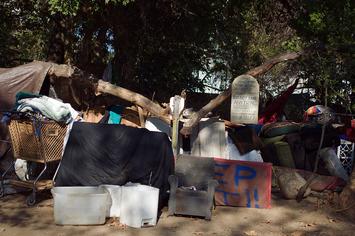
For most of the last century, Los Angeles loomed as the next great American city, a burgeoning paradise riding the shift of world power west. It seemed posed to leave New York and London in the dust, the engines of growth inexorable. There was the city's dominance of the entertainment and aerospace industries, which incited migration from both the rest of the country and abroad, and all this promise was symbolized by a spread of suburban single-family houses that seemed to embody the ideal American dreamscape.
But today, it's clear that the Big Orange was not ready for its closeup. These days, Los Angeles is clearly on the decline, a fact that stems from a persistent lack of leadership, policy stumbles and growing competition from a whole rash of "new L.A.s," from Dallas-Ft. Worth to Nashville, Las Vegas and Phoenix.
The pandemic provides the most recent snapshot of L.A.'s troubled future. While the COVID-19 pandemic was driving people around the country to less dense places, the leaders of the city that invented the multi-polar urban model remain determined to continue their failing efforts to convert L.A. into a dense, transit-oriented Pacific Rim New York. Little consideration has been given to the the fact that Los Angeles had one-third fewer COVID-19 deaths than the New York metropolitan area—in part due to a relative lack of transit riders, warm weather, and the primacy of single-family homes.
Rather than seizing on the crisis to promote these elements, L.A. has managed to all but match New York's pandemic paralysis. Last year, it suffered a population outflow among the highest in country, basically matching New York's. It also has suffered the highest unemployment rate of the nation's top ten metro areas, higher even than New York, The Seidman Institute at Arizona State University found.
But the COVID-19 failures are part of a much bigger problem. Persistently weak leadership stands at the root of L.A.'s decline.
For much of the 20th Century, Los Angeles was led by aggressive business leaders. Many were self-made, often somewhat nasty moguls, men like Jack Warner, Walt Disney, Lew Wasserman, Mark Taper, Howard Ahmanson Sr, Donald Douglas, Jerry Buss. They faced derision from eastern elites but they didn't care; they consistently pushed for all the things that made for L.A.'s ascendency, from roads and bridges to arts institutions and glittering office parks to housing tracts.
Today there are few such figures. Once a beacon for up-and-coming companies, L.A.'s corporate community is diminishing, and the person who had the most potential, Elon Musk, recently announced his departure for Texas. Southern California is home to just 19 Fortune 500 companies today, equal to Denver and Seattle and roughly half the number in the Bay Area, Dallas and Houston, not to mention New York and Chicago. This year, a long time corporate power, the real estate firm CBRE, decided to move from its downtown L.A. office to Dallas.
The city's power vacuum has been evident for years. Even the Chandlers, widely considered the foundational geniuses or villains behind the "old L.A.," have abandoned their vehicle, the Los Angeles Times, to other owners. Local business organizations increasingly are led not by entrepreneurs with a large stake in the city, but by regional managers, lawyers, consultants, and professional meeting goers.
Read the rest of this piece at Newsweek.
Joel Kotkin is the author of The Coming of Neo-Feudalism: A Warning to the Global Middle Class. He is the Presidential Fellow in Urban Futures at Chapman University and Executive Director for Urban Reform Institute. Learn more at joelkotkin.com and follow him on Twitter @joelkotkin.
Photo: Levi Clancy via Wikimedia, under CC 4.0 License.












